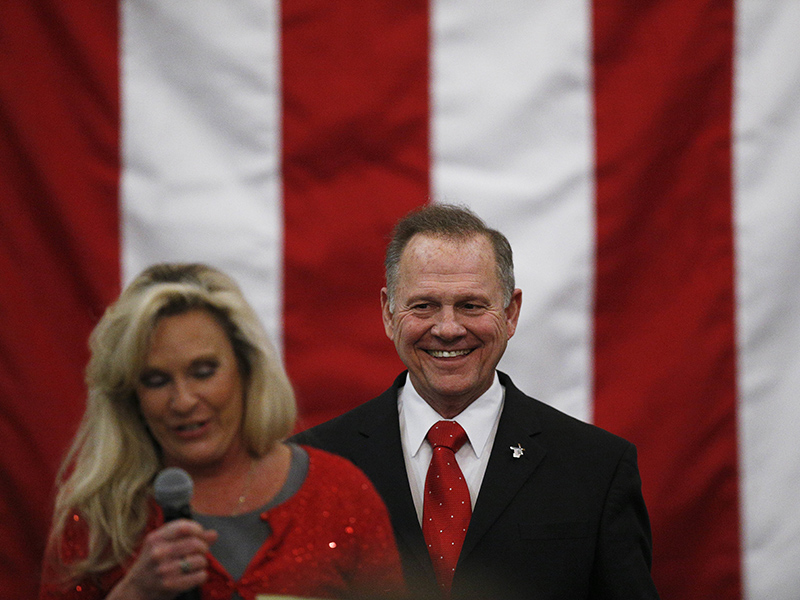Everyone agrees that Democrat Doug Jones won yesterday’s hotly contested Senate race in Alabama. Everyone, that is, except Republican candidate Roy Moore.
The controversial candidate refused to admit defeat in a speech delivered late last night. Instead, he asked his supporters to “wait on God and let this process play out.” Moments after Moore’s speech, however, it became clear that the twice-fired judge isn’t the only one refusing to embrace reality.
Albert Mohler, president of The Southern Baptist Theological Seminary, appeared on CNN around 1 a.m. to give conservative Christians credit for the controversial Republican’s defeat.
“[Moore] lost because so many evangelicals didn’t show up. That’s the big story … what didn’t happen,” Mohler said.
But Mohler’s assertion flies in the face of the facts. Eight in 10 white evangelicals cast their vote yesterday for Moore, a man credibly accused of sexual misconduct with multiple underage women. That’s roughly the same number who one year ago voted for Donald Trump, a man credibly accused of sexual misconduct with several women who has also admitted to engaging in such behavior. (Additionally, the percentage of evangelicals who voted for a write-in candidate was roughly on par with the general electorate.)
The picture remains bleak when you break out the stats by gender. As ABC News’ Matthew Dowd noted, 76 percent percent of white evangelical women voted for Moore, while 74 percent of non-evangelical white women voted for Jones.
Mohler is a shrewd thinker and capable culture watcher, so I assume he must be referring to the evangelical share of the total electorate. White evangelical Christians comprised 44 percent of all voters yesterday, compared with 47 percent of voters in the 2008 and 2012 elections. But this tiny shift, which The Washington Post referred to as “slight signs of slippage,” is nothing to crow about.
Imagine for a moment that 80 percent of white evangelicals in Alabama—many of them attending churches affiliated with Mohler’s denomination—voted yesterday in favor of polygamous marriage or partial birth abortion. In such a scenario, can you imagine conservative leaders like Mohler bragging about their community’s courage and convictions? I can’t. Yet, this is somehow the conclusion drawn when evangelicals voted in overwhelming numbers for sexual abuser like Moore who wants to make homosexual behavior illegal and ban Muslims from public office.
The real heroes yesterday were black voters—particularly black women—in Alabama who turned out in high numbers. Ninety-three percent of black men and a staggering 98 percent of black women cast their votes for Jones. Since 2008, black voters in Alabama have made up about 25 percent of the electorate. Yesterday, they comprised nearly 30 percent. White male leaders—evangelical or otherwise—should consider how it looks when they appear to be stealing credit here.
Some evangelical leaders may understandably want to spin Moore’s loss as a victory for conservative Christians. After all, the evangelical movement is in the midst of a cataclysmic PR crisis, thanks in part to their recent political engagement.
American evangelicals have long claimed to be “values voters” who believe that “character counts.” Though they once led the charge to impeach Bill Clinton for his misbehaviors, evangelicals are now more tolerant of politicians’ immoral behaviors than the average American. The groups’ reputation has been tarnished in the eyes of many Americans who see them as partisan hypocrites, more concerned about political power than piety.
Sure, many prominent evangelical leaders, including Albert Mohler, vocally opposed Trump and Moore. But the poll numbers show overwhelming support for both candidates among ordinary churchgoers. This is the truth, and the sooner evangelicals accept it, the sooner they can address it.
As C.S. Lewis wrote in Mere Christianity, “In religion, as in war and everything else, comfort is the one thing you cannot get by looking for it. If you look for truth, you may find comfort in the end; if you look for comfort you will not get either comfort or truth.”
Some people choose to live in houses filled with covered mirrors, but Christians cannot afford to be those kinds of people. Christian theology is built on the principles of self-reflection, confession, and repentance. For these to occur, evangelicals must stop pretending they are a moral voice of reason in the American public square and instead begin getting their houses in order.
I felt pity watching Roy Moore refuse to concede last night. Few things are more pitiful than the delusions of the defeated. Evangelicals must not make the same mistake as Moore. It’s time to trade wishful thinking for soul-searching.







